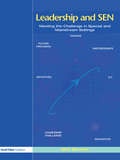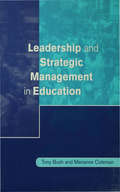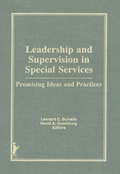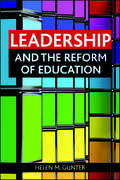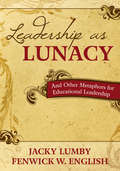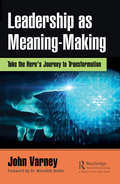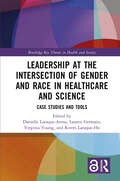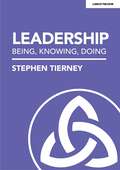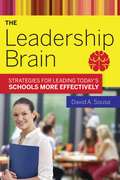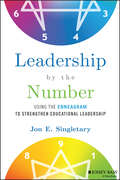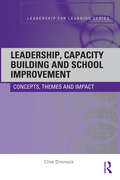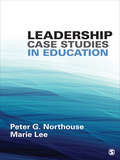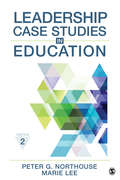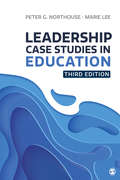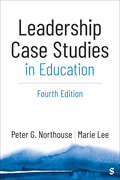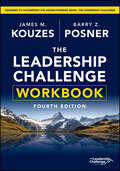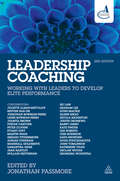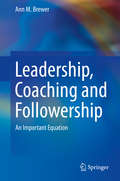- Table View
- List View
Leadership and SEN: Meeting the Challenge in Special and Mainstream Settings
by BurnettHow can leaders turn their schools into outward looking centres of excellence? Answering that question, this book focuses upon the work of cutting edge leaders who are responding to the challenges of recent legislation and guidelines. It includes: thoughtful case studies examine school culture, restructuring and reorganization mind maps and chapter summaries to help readers get on top of crucial issues and ideas helpful pointers on how to avoid pitfalls and maximise successes. For special school leaders and prospective leaders, those involved in making decisions about specialist provision and anyone delivering training and support to those professionals.
Leadership and Strategic Management in Education (Centre for Educational Leadership and Management #2)
by Tony Bush Dr Marianne Coleman`This is one of very few texts to give recognition to the difficulties in large institutions and to give practical advice about the degree to which collegiality can be built into strategic planning. The authors provide an overview of all aspects of leadership within education, giving ample references within each section for more detailed study' - Mentoring and Tutoring `The book would constitute a good starting-point for anyone wishing to understand contemporary developments in educational management' - Educational Research Leadership and strategic management are both issues of central importance in raising achievement in schools and colleges and thus are at the heart of the educational debate today. This book is concerned with such major issues as: the nature of strategic management in education; the importance of vision, and mission; styles of leadership; models of educational management; and the purposes of strategic management, which here are equated with the effectiveness and improvement of the institution. It will be invaluable for students of educational management, such as those following masters degrees. It is also directly relevant to teachers and lecturers and schools of all phases and in further education colleges, particularly those who have, or aspire to, management responsibilities. The textbook is designed to be used either to accompany a taught course, or for self-study via distance-learning, thus practical and reflective activities are included.
Leadership and Supervision in Special Services: Promising Ideas and Practices
by Charles A Maher David E Greenburg Leonard BurrelloHere is an authoritative reference on a range of subjects vital to supervisory personnel whose responsibilities include children with learning and/or behavior problems. Leading professionals - serving as members of a special writing team of the Council of Administrators of Special Education (CASE) - offer a rich source of ideas especially for administrative personnel involved in the delivery of special educational programs and services to children with handicapping conditions. Chapters cover such topics as critical success factors, supervision and evaluation, cost analysis, and more.
Leadership and the reform of education
by Helen M. GunterWestern politicians consider that leadership is essential for the delivery of educational reform. This important and timely book examines how leaders, leading and leadership became the dominant theme in education. It presents an analysis of the relationship between the state, public policy and the types of knowledge that New Labour used to make policy and break professional cultures. It is essential reading for all those interested in public policy, education policy, and debates about governance and will be of interest to policymakers, researchers and educational professionals.
Leadership as Lunacy: And Other Metaphors for Educational Leadership
by Jacky Lumby Fenwick W. English"This book will challenge, enlighten, and transform. The authors invite us to re-examine our core values as educational leaders, reconsider our priorities, and place the humanity of children at the center of our work."—Nancy Skerritt, Assistant Superintendent,Tahoma School District, Maple Valley, WA"By their analysis, Lumby and English expose the power of language to shape meaning. By their skill, they illustrate the power of language to engage and enrich. Their work is an important contribution to how we understand and practice leadership in all fields."—Steven R. Thompson, Coordinator, School Leadership Program, Miami UniversityAn imaginative approach to rethinking and revitalizing your leadership practice!Research has shown that metaphors inspire leaders to reflect on their mind-sets, behaviors, practices, and approaches, leading to new perspectives on their roles. Using such thought-provoking and unexpected metaphors as "leadership as war" and "leadership as lunacy," the authors draw readers through historical perspectives and cognitive possibilities that inspire, resolve, confuse, and provoke reflection on the state of leadership in education. This book examines the current discourse on educational leadership models, behaviors, and roles, and helps school and district leaders:Understand the power of metaphor and how metaphors have been used to define leadershipDevelop a deeper connection to their roles and their approaches Initiate change in themselves and in othersBy inspiring creative thinking and critical reflection, Leadership as Lunacy helps leaders achieve personal and professional growth and invigorate their professional relationships!
Leadership as Meaning-Making: Take the Hero's Journey to Transformation
by John VarneyBased on the author’s 30 years experience of management development and a background in design and psychology, this book takes a fresh look at leadership as a systemic shared phenomenon. It is one aspect of the evolutionary principle of bringing people to maturity as human beings – transforming the immature through purposeful adventure. This is not a “how-to” book of tools and techniques but is a guide to personal development. It plots the territory of the hero’s journey (after Joseph Campbell) through unknown worlds. It explains the metaphorical relationship to personal and collective transformation by means of the cyclic pattern of the hero’s journey, overlaid with the enneagram framework. Succeeding chapters spell out practical details for making the journey towards maturity, which alone makes leadership a viable possibility. Only such purposeful leadership will enable others to make their own equivalent journeys. If such people are engaged in work, then they will be more conscious and more effective. Essentially, the book is intentionally quickly communicates a broad sweep of related ideas that form a philosophy for the development of the inner qualities of effective leadership, applicable in all walks of life. The story of the archetypical hero’s journey is suggested as applying to every individual. The hero’s journey is an allegory for a quest for inner growth. It can rub off onto others through what we call “leadership”. Such leadership is what brings meaning to people’s lives. Thus this book is a counter to the empty manipulative techniques propagated by much of the popular writing on leadership, which pays little attention to transformative interaction. There are exercises at the end of each chapter and additional material is available to readers via the internet.
Leadership at a Distance: Research in Technologically-Supported Work
by Suzanne P. WeisbandThis volume offers insights from a noted group of scholars who discuss the complex phenomenon of leadership in distributed work settings - also known as leadership at a distance. Editor Suzanne Weisband addresses the ubiquitous roles leaders play, their scale of work, and the range of technologies available to them, while setting new directions in
Leadership at the Intersection of Gender and Race in Healthcare and Science: Case Studies and Tools (Routledge Key Themes in Health and Society)
by Danielle Laraque-Arena Lauren Germain Virginia Young Rivers Laraque-HoThis book takes a case study approach to explore leadership narratives of women in healthcare and science, paying attention to the intersection of gender, identity, and race in each story. Putting forward a new vision and pathway inclusive of the lived experiences and contributions of women worldwide, this text proposes a strength-based approach to meeting leadership challenges. Key themes discussed include leadership redefined by those not identifying as leaders, the influence of the intersectionality of race and gender on leadership, and the implications for how we teach about leadership in healthcare and science. Grounded in theory that is translated into practice and evidenced by the leadership case studies described, the book draws out useful tools and organizational learnings to support transformation of the landscape of clinical care, education, research and policies healthcare and science. This book is an invaluable reference for leaders at all levels across healthcare and science. It is also of interest to students and academics from gender studies, leadership studies, organization and governance, anthropology, sociology, higher education, public health, social work, nursing and medicine.
Leadership: Being, Knowing, Doing
by Stephen TierneyIn an increasingly frenetic world too many leaders have lost sight of the simple yet profound wisdom associated with practical action, otherwise known as phronesis. Phronesis is an ancient Greek word associated with good judgement and good character. At its core, it is about the ability to discern how best to act. Practical wisdom involves acting thoughtfully and virtuously and encouraging others to do the same. Stephen Tierney describes virtue, thought and action – which coalesce in effective leadership – as the Way of Being, Way of Knowing and Way of Doing. Each of the three Ways consist of a number of elements termed the Basics. The Ways of Being: Purpose & Introspection The Ways of Knowing: Specialism & Strategy The Ways of Doing: Implementation, Networking, Guardianship & Expertise Structuring the book around these eight Basics, readers will be challenged and supported to explore each of the Basics from a theoretical perspective and then provided with real world examples of how they were applied by Stephen in his own career in educational leadership. In writing Leadership: Being, Knowing, Doing, Stephen seeks to help leaders explore their own capabilities and potential. Leadership can be learnt. The three Ways with their constituent Basics represent a mirror to help leaders reflect upon and improve their practice. In turn, current leaders are called upon to accept the responsibility to grow the leaders of the future.
Leadership: Being, Knowing, Doing
by Stephen TierneyIn an increasingly frenetic world too many leaders have lost sight of the simple yet profound wisdom associated with practical action, otherwise known as phronesis. Phronesis is an ancient Greek word associated with good judgement and good character. At its core, it is about the ability to discern how best to act. Practical wisdom involves acting thoughtfully and virtuously and encouraging others to do the same. Stephen Tierney describes virtue, thought and action – which coalesce in effective leadership – as the Way of Being, Way of Knowing and Way of Doing. Each of the three Ways consist of a number of elements termed the Basics. The Ways of Being: Purpose & Introspection The Ways of Knowing: Specialism & Strategy The Ways of Doing: Implementation, Networking, Guardianship & Expertise Structuring the book around these eight Basics, readers will be challenged and supported to explore each of the Basics from a theoretical perspective and then provided with real world examples of how they were applied by Stephen in his own career in educational leadership. In writing Leadership: Being, Knowing, Doing, Stephen seeks to help leaders explore their own capabilities and potential. Leadership can be learnt. The three Ways with their constituent Basics represent a mirror to help leaders reflect upon and improve their practice. In turn, current leaders are called upon to accept the responsibility to grow the leaders of the future.
The Leadership Brain: Strategies for Leading Today?s Schools More Effectively
by David A. SousaCognitive neuroscientists are gaining greater insights into how the brain interacts with and learns from the environment. Now David A. Sousa, one of the foremost experts in translating this research into classroom practice, examines the brain-compatible leadership practices that sustain effective teaching and learning. The Leadership Brain provides a new model for a whole-brain approach to educational leadership. Examining what we know about the adult brain, and how to apply these lessons to effective school leadership and team management, this powerful resource provides you with the necessary tools to: Understand the differences in learning and retention, left and right hemispheric preferences, higher-order thinking, and the nature of creativity Initiate and lead productive change within your school Effectively shape and manage school culture Address the call for ethical and spiritual leadership Understand how thinking habits influence our actions, especially with problem solving and conflict resolution Reduce misconceptions about students with disabilities, gifted, and minority students Use information about the influence that modern society has on student learning and their different expectations The Leadership Brain includes valuable self-assessment tools, resources, and practical applications that will help instructional leaders develop a modern, creative, team-centered school where all students and teachers can reach their full potential.
Leadership by the Number: Using the Enneagram to Strengthen Educational Leadership
by Jon E. SingletaryHarness the power of ancient Enneagram philosophy to maximize your educational leadership impact In Leadership by the Number: Using the Enneagram to Strengthen Educational Leadership, distinguished academic and leadership coach Dr. Jon Singletary walks you through how to use the ancient wisdom of the Enneagram of Personality with modern contemplative practices to transform how you lead your department, school, college, or university. You'll learn to effectively balance the conflicting demands of your role with greater patience, skill, and peace-of-mind by changing how you think, act, and feel every day. In the book, the author provides: Explanations of the benefits of self-aware leadership, including the identification of competing forces and understanding stakeholders' strengths and weaknesses Insights into the critical role of self- awareness in educational leadership Concrete strategies for strengthening university, college, unit, and departmental leadership A can't-miss resource for higher education administrators and other school leaders, Leadership by the Number also belongs in the hands of students of education and leaders-in-training who wish to maximize the impact they can have on the institutions they'll one day lead.
Leadership, Capacity Building and School Improvement: Concepts, themes and impact (Leadership for Learning Series)
by Clive DimmockLeadership, Capacity Building and School Improvement provides a fresh and original perspective on the most important issues confronting today’s practitioners and academics in the field of educational leadership. New and exciting concepts are introduced such as the research-engaged school of the future. While its theoretical and evidence-based approach raises to a robust level the discussion on the most important leadership challenges of the day, the book is at the same time intensely practical in addressing everyday issues faced by contemporary policy makers and school practitioners. Underpinning the eleven chapters is a conceptual framework founded on the notion of leadership as capacity building, giving the book a coherence that many others on school leadership lack. Among the themes actively discussed are: Conceptualising and Contextualising Leadership – what is leadership? What distinguishes good from mediocre and poor leaders? What are the traits, dispositions and attributes that make for good leadership? How does context influence leadership? How appealing is leadership as a career? What are the components of capacity building leadership? Contemporary Leadership Themes – what is learning-centred leadership and how can it best promote good teaching and student learning? How can leaders distribute leadership across the school, and what are the pitfalls? How can leaders capitalise on the notion of the school as a professional learning community? How can leaders best be nurtured and developed? Policy, Leadership Practice and Impact – what new forms of leadership are presaged by the specialist schools policy as a means of school improvement? How can schools combine a focus on academic achievement with the need to prepare students for the changing twenty-first century workplace? Leadership, Capacity Building and School Improvement provides an up-to-date authoritative, critical and insightful account of school leadership. It combines advocacy and argument with evidence-based practice drawn from the most plausible and robust sources. This book will prove a valuable tool for those taking higher degrees in school leadership and management: school leaders on NPQH courses and school practitioners as a whole interested in interfacing with the latest empirical evidence and ideas, as well as academics teaching and researching in the area of educational leadership. Since the book adopts an international perspective, drawing its examples and evidence from both the Anglo-American and the Asian contexts, it will be found relevant to academics, policy makers and practitioners across these regions. Clive Dimmock is Visiting Professor at the National Institute of Education in Singapore and Professor Emeritus at the University of Leicester, UK.
Leadership Case Studies in Education
by Dr Peter G. Northouse Marie E. LeeLeadership Case Studies in Education looks at leadership through the eyes of educators. The text examines how the major theories and models of leadership apply to education. Taking a clear, concise, and informative approach, Peter G. Northouse, Marie Lee, and contributors from all levels of the education discipline provide readers with real-world case studies that illustrate the complex leadership challenges and issues facing educators today. Engaging, practical, and relevant, Leadership Case Studies in Education is the perfect companion for educational leadership courses.
Leadership Case Studies in Education
by Dr Peter G. Northouse Marie E. LeeLeadership Case Studies in Education looks at leadership through the eyes of educators. The text examines how the major theories and models of leadership apply to education. Taking a clear, concise, and informative approach, Peter G. Northouse, Marie Lee, and contributors from all levels of the education discipline provide readers with real-world case studies that illustrate the complex leadership challenges and issues facing educators today. Engaging, practical, and relevant, Leadership Case Studies in Education is the perfect companion for educational leadership courses.
Leadership Case Studies in Education
by Dr Peter G. Northouse Marie E. LeeEngaging, practical, and relevant, Leadership Case Studies in Education, Second Edition by Peter G. Northouse and Marie Lee applies leadership theories in educational settings. Designed to be used alongside Leadership: Theory and Practice, Eighth Edition, this casebook provides relevant, substantive, and contemporary case studies on leadership issues in Higher Education and K-12 Education. Each of the 32 case studies include critical thinking questions that encourage students to apply leadership theory and concepts to real-life situations. Fully updated with new citations, statistics, and a new chapter on followership, Leadership Case Studies in Education is the perfect companion for educational leadership courses.
Leadership Case Studies in Education
by Dr Peter G. Northouse Marie E. LeeEngaging, practical, and relevant, Leadership Case Studies in Education, Second Edition by Peter G. Northouse and Marie Lee applies leadership theories in educational settings. Designed to be used alongside Leadership: Theory and Practice, Eighth Edition, this casebook provides relevant, substantive, and contemporary case studies on leadership issues in Higher Education and K-12 Education. Each of the 32 case studies include critical thinking questions that encourage students to apply leadership theory and concepts to real-life situations. Fully updated with new citations, statistics, and a new chapter on followership, Leadership Case Studies in Education is the perfect companion for educational leadership courses.
Leadership Case Studies in Education
by Peter G. Northouse Marie E. LeeLeadership Case Studies in Education 3rd Edition by Peter G. Northouse and Marie Lee applies leadership theories in educational settings. Designed to be used alongside Leadership: Theory and Practice 9th Edition, this casebook provides relevant, substantive, and contemporary case studies on leadership issues in Higher Education and K-12 Education. Each of the 32 case studies include critical thinking questions that encourage students to apply leadership theory and concepts to real-life situations. Engaging, practical, and relevant, Leadership Case Studies in Education is the perfect companion for educational leadership courses.
Leadership Case Studies in Education
by Peter G. Northouse Marie E. LeeLeadership Case Studies in Education 3rd Edition by Peter G. Northouse and Marie Lee applies leadership theories in educational settings. Designed to be used alongside Leadership: Theory and Practice 9th Edition, this casebook provides relevant, substantive, and contemporary case studies on leadership issues in Higher Education and K-12 Education. Each of the 32 case studies include critical thinking questions that encourage students to apply leadership theory and concepts to real-life situations. Engaging, practical, and relevant, Leadership Case Studies in Education is the perfect companion for educational leadership courses.
Leadership Case Studies in Education
by Peter G. Northouse Marie E. LeeLeadership Case Studies in Education 4th Edition by Peter G. Northouse and Marie Lee applies leadership theories in educational settings. Designed to be used alongside Leadership: Theory and Practice 10th Edition, this casebook provides relevant, substantive, and contemporary case studies on leadership issues in Higher Education and K-12 Education. Each of the 32 case studies include critical thinking questions that encourage students to apply leadership theory and concepts to real-life situations. Engaging, practical, and relevant, Leadership Case Studies in Education is the perfect companion for educational leadership courses. New cases explore social identity leadership and team leadership theories, with examples including the challenges of teaching virtually during the COVID-19 pandemic, the formation of a union of college adjunct professors, and a high school′s challenge in changing their offensive school mascot symbol.
Leadership Case Studies in Education
by Peter G. Northouse Marie E. LeeLeadership Case Studies in Education 4th Edition by Peter G. Northouse and Marie Lee applies leadership theories in educational settings. Designed to be used alongside Leadership: Theory and Practice 10th Edition, this casebook provides relevant, substantive, and contemporary case studies on leadership issues in Higher Education and K-12 Education. Each of the 32 case studies include critical thinking questions that encourage students to apply leadership theory and concepts to real-life situations. Engaging, practical, and relevant, Leadership Case Studies in Education is the perfect companion for educational leadership courses. New cases explore social identity leadership and team leadership theories, with examples including the challenges of teaching virtually during the COVID-19 pandemic, the formation of a union of college adjunct professors, and a high school′s challenge in changing their offensive school mascot symbol.
The Leadership Challenge Workbook: Student Workbook And Personal Leadership Journal (J-b Leadership Challenge: Kouzes/posner Ser.)
by Barry Z. Posner James M. KouzesTHE LATEST EDITION OF THE GOLD STANDARD LEADERSHIP DEVELOPMENT FRAMEWORK The world’s best leaders consciously reflect on their own behaviors and choices in an effort to continuously better themselves. In the thoroughly revised and updated Fourth Edition of The Leadership Challenge Workbook, renowned leadership educators James M. Kouzes and Barry Z. Posner deliver their latest update to one of the world’s bestselling works on leading others in organizational settings. You’ll find practical guidance on how to apply the insights from The Leadership Challenge to your daily life, as well as hands-on tips for communicating your vision, strengthening workplace commitment, building employee trust, and maintaining worker satisfaction. Based on the insights of the Seventh Edition of James Kouzes and Barry Posner’s The Leadership Challenge, the hands-on experience of the Workbook engages you to examine and improve your ability to put into action The Five Practices of Exemplary Leadership®. The revised Fourth Edition of The Leadership Challenge Workbook will help leaders in every organization to make extraordinary things happen.
Leadership Challenges in High Schools: Multiple Pathways to Success
by W. Norton GrubbPrincipals are responsible for an increasing range of duties in an era of school reform, standardized testing, and more. These responsibilities are even greater in high schools, which are many times larger and more complex than elementary and middle schools. Yet little has been written on the special challenges of high schools and their leadership. This book fills the gap by exploring the challenges specific to high schools, including their size and complexity, the special difficulties in improving instruction, the crucial role of high schools for students' futures, adolescent behavioral issues, and many more. Grubb shows how principals and other leaders can address the complexities of multiple pathways, or efforts to create theme-based trajectories through high school - one of the most promising high school reforms. Looking to the future, he offers alternative ways of preparing professionals for high schools, and the responsibilities of districts for improving high schools and their leadership.
Leadership Coaching
by Association for Coaching Jonathan PassmoreThis revised edition of the highly-respected Leadership Coaching will enhance and extend your coaching practice. It draws on evidence-based thinking and the writing of some of the world's top leadership thinkers and coaching practitioners to present a start-of-the-art coverage of leadership models and how to use them effectively to benefit your coaching relationships. Leaders face many challenges, and this book will challenge you to adapt your coaching approach to suit your clients' needs. Its coverage ranges from newer topics such as strengths focused leadership and conversational leadership to more tried-and-tested frameworks such as Porter's strategy model and Goleman's model of leadership styles. It also has a deliberately international flavour, incorporating non-Western perspectives from Asia and Africa and considering multinational topics like coaching global boards.
Leadership, Coaching and Followership
by Ann M. BrewerThis volume presents evidence-based ideas on all three converging forces to suit an array of individuals and their organisations. The volume is thick with evidence, detail and case studies that the reader can draw upon and apply to their own situations. Defining exactly what is leadership has been a persistent problem for researchers and theorists. Discovering how to create or produce leaders likewise has been a difficult challenge over the years. Written by an academic, executive and coach, the author focuses on three important converging aspects: leadership, followership and coaching. Focus on leaders is disproportionate to what actually occurs within most organisations especially the relationship between the leader and the followers. That leadership is tantamount with being in control of a situation is challenged, together with the belief that leadership capability is primarily shaped in line with a set of success criteria. The coach plays a significant part in this process although rarely visible.
